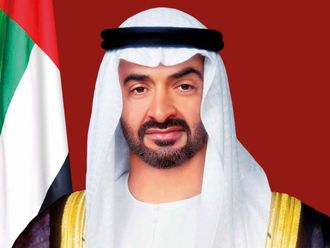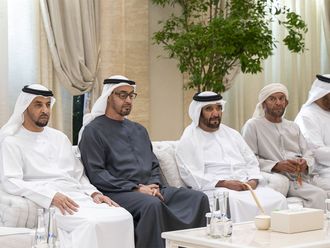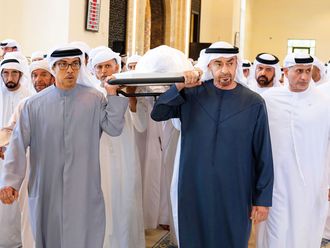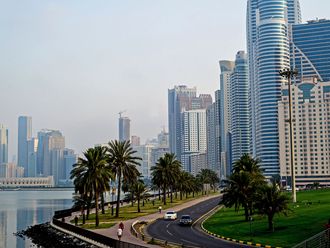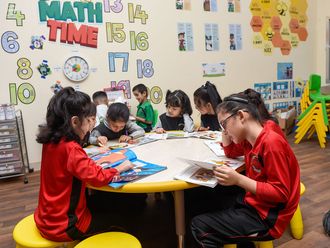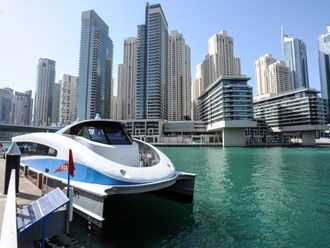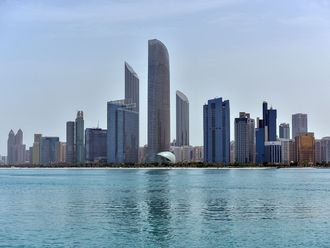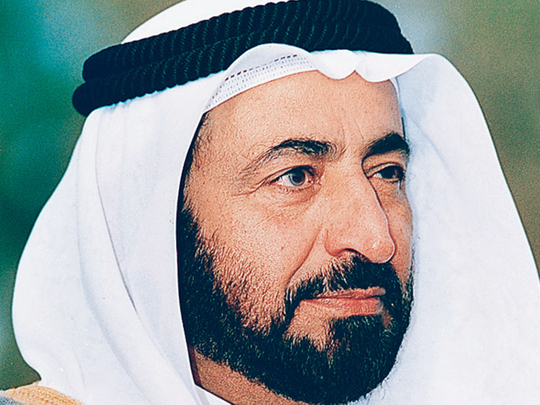
Launched at the Sharjah book fair in November 2009, His Highness Dr Shaikh Sultan Bin Mohammad Al Qasimi, Supreme Council Member and Ruler of Sharjah’s autobiographical book Sard Al That explores the historic struggle with Israel and Egypt as the focal point of the Arab world.
In an exclusive interview with Sharjah TV, Dr Shaikh Sultan called for Arabs to unite, renounce disparity, be ‘humble’, abandon ‘egoism’ and adopt a long-term policy to continue their historic struggle against Israel.
In pictures: a peek into Shaikh Sultan's new book
Dr Shaikh Sultan stressed that Israel wants to separate the Arab world by creating conflict in Lebanon, Syria and involving Egypt in a religious struggle.
The Sharjah Ruler continued that a quick victory is sought, and it is necessary for the Arab world to unite. He stressed the significance of Egypt’s role in the Arab world, adding that it’s the Arab world’s “focal centre and nucleus”.
He is planning to write a second part of Sard Al That, focusing on Sharjah’s history and the story of the UAE union. Sard Al That is published by Al Qasimi Publishing.
SHARJAH TV: Why did you name the book ‘Sard Al That'? What is the secret behind choosing this title?
HIS Highness Dr Shaikh Sultan Bin Mohammad Al Qasimi: The word Sard in Arabic means to speak and talk in a good manner, while That does not mean "oneself", but whatever can be published or told. I omitted 30 per cent of the content because I did not want it to stir hatred — this is unacceptable.
Why have you launched "Sard Al That" now and what can the younger generation learn from it?
The book narrates the story of a boy, a teenager, a young man and old man. These phases have a major impact on any personality and the readers of the book will notice many things that have formed my character in childhood, boyhood and youth. If you read the book, you will notice that this man has been committed to principles, heritage and nationalism from the very beginning.
How did your father and uncle influence you?
My father never raised a stick, laid a hand on me or shouted at me when I was a kid. My uncle on the other hand was kind, tolerant, educated, a poet and had two personal libraries. I lived with my uncle before turning nine and learnt to love others from him. Mentioning an example on his kindness which I haven't written in the book, a man, who complained to my uncle about rotten meat he bought from the market, threw the meat on the floor and scattered blood on my uncle's clothes. The guards wanted to punish him but my uncle ordered them to leave him, asked the servant to give the meat to the dogs and re-paid him his money.
Does this mean that your uncle loved you more than others?
My uncle loved us all, but I was closer to his children because we belonged to the same age group. We were brought up together, lived at the same house and consequently developed a strong friendship.
How did reading refine your personality?
My uncle had a library at the fort and another one in the corridor opposite his bedroom at the Western House. I also did the same thing. I set up my library in the corridor in front of my bedroom so that books never leave my sight. After my uncle's death, his body took a long time to arrive from London to Sharjah and this was an opportunity for me and his children to have a look at his books. I always tell my son that no one can extract knowledge from your brain, but money comes and goes.
What kinds of books did you prefer?
Finding books at that period wasn't easy. We used to get them from Egypt, via Eden and India. I liked the biography of Antar Bin Shaddad, Hassan Al Basri, and Abu Zaid Al Hilali. I used to look at the titles of books in my uncle's library and then order them from Al Moayad Bookstore in Bahrain. All this helped me to establish my personal library at the age of 11 and consequently develop my personality.
How did the owner of the bookstore react when he found out who you were?
He had imagined an old man. My uncle's library included Al Shawkiat (the poetry works of Ahmad Shawqi). The owner never imagined a boy of my age reading those books. I used to buy books with my own pocket money.
Arab nationalism and unity significantly contributed to developing your personality, where did you first read about them?
I heard about them from school and from my father who was anti-British. We used to hear those words from him. This was the first spark. The belief in Arab nationalism developed in us through non-Egyptian teachers, like Mohammad Diab Al Mousa, who had migrated from Palestine in 1948. My first actual contact with Arab nationalism came through the Al Ba'ath Party.
Did your support of Egyptian President Jamal Abdul Nasser and against the opening of the Israeli office in Tehran embarrass the ruler?
No. The ruler, Shaikh Saqr then, and a group of traders were nationalists. He promoted Arab nationalism in Sharjah. The British might have been tough with my uncle about his views towards the war and the changes during that period because of his responsibilities, but he managed to persuade them to bring back a teacher who was earlier deported because of his views on Palestine.
How did your travels for the Haj (pilgrimage) to Iran and Pakistan impact you?
It was an opportunity. We used to travel to Ras Al Khaimah and Khor Fakkan, but Bahrain was my first trip outside the region. Travelling is an eye-opener, it helps you meet people. My trip to Tehran was another opportunity as well.
You look at Egypt with high respect, can you comment on that?
Egypt was living in a state of flux and formation when I visited it. In 1965, Abdul Nasser finished outlining the Arab Nationalism school of thought which aimed at establishing one entity with common characteristics. We were affected by all this. The Egyptian government was not only the major contributor towards the development of this school of thought but literature and storytelling was equally affected. If anyone wants now to evaluate the production of that period, he will find that it was unique. Currently, the public might not be aware of Egypt's assets, but it has a huge heritage. I did not mention anything distorting about Egypt's image because it is a beautiful country and its people are full of creativity. Egypt is the Arab nation's focal centre. Egypt has united the Arabs and the impact of its experience on us still exists. I hope Egypt returns to that old approach. Here, I do not call Arabs to be followers but participants in order to withstand dangers threatening our nation. Israel wants to divide us. It tries to do so in Lebanon and Syria and involve Egypt in a religious conflict. It is necessary for us to unite. Our struggle with Israel is historic, but unfortunately we neither have the patience nor adopt a long-term policy to withstand it. We want quick victories. Through this interview, I urge Arab officials to be ‘humble', abandon ‘egoism', and adopt a long-term policy in order to withstand this struggle.
You returned from Cairo during your university studies to prevent the demolition of Sharjah Fort; can you tell us the story?
The fort was adjacent to our house. We saw it daily and played in the playground facing it. I had to come back to stop the demolition and I was able to.
Your book talks of Arab unity and the establishment of the UAE, how did people feel about the union?
The project included Bahrain and Qatar as well but later the UAE only. The agreement between Shaikh Zayed and Shaikh Rashid was the motivator. Ras Al Khaimah withdrew initially but re-joined afterwards. The rulers were convinced this was the right move to face any threats and people also believed it was good for the region.
What can you tell us about Shaikh Khalid Bin Mohammad Al Qasimi's death?
The book contains 13 chapters written in two and a half months during my summer holidays. I returned before Ramadan with that particular chapter to finish. It was the most difficult. I stopped many times before completing it because its tricky and I did not want to write anything I could have been held responsible for especially as I am an eyewitness and an official. I just wanted to narrate the events and my story. Shaikh Khalid was kind and pious but Shaikh Saqr opposed his views. I remember the day he died. After leaving the Ruler's Court heading to the palace, he wanted to have a bath and I told him I will bring some papers until he finishes but he died by the time I returned. I preferred to stop narrating the story at that end.
You ended the book with the sentence: "Congratulations for becoming the ruler", are you planning to write another book on your rulership?
Sharjah's history and the UAE union are important. They must be written and recorded. Shaikh Zayed and Shaikh Rashid, the founders of the UAE, exerted all efforts to achieve that goal. Their lives should be documented by those who lived and worked closely with them. It is a matter of loyalty.


